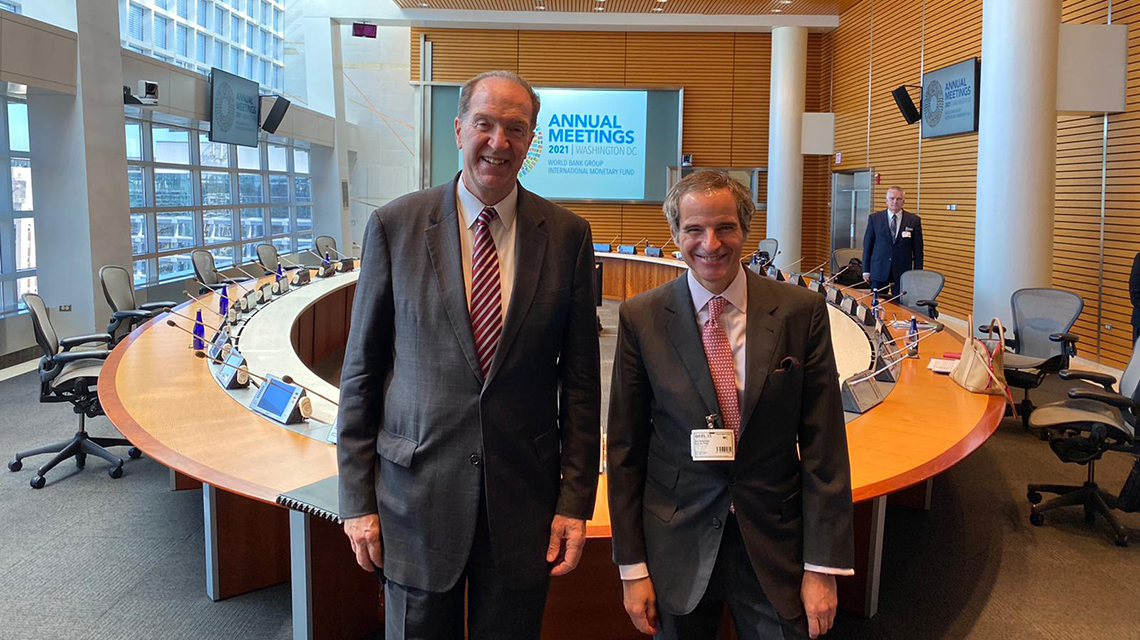IAEA Director General Rafael Mariano Grossi met with the heads of the World Bank and the Inter-American Development Bank (IDB) yesterday to discuss joining forces to combat cancer and to address climate change and other areas critical for sustainable development.
Mr Grossi held talks with World Bank President David Malpass and IDB President Mauricio Claver-Carone, during a visit to Washington, DC. Both the World Bank and the IDB are based in the US capital, where he also met with senior government officials, prominent lawmakers, think-tank experts and others this week to discuss the IAEA's wide range of work.
At the World Bank and the IDB, Mr Grossi highlighted the many ways nuclear technology, techniques and science help improve people's lives, from human health to food security, water management and more. With just ten days to go before COP26 starts in Glasgow, he spoke about the vital role of nuclear energy in climate change mitigation and adaptation.
"The three organizations share the overarching objective of doing everything they can to ensure a better future for the planet and for coming generations. By working together and drawing on each other's unique strengths and skills, we can maximize the impact of our efforts to address the most pressing threats and challenges of our time," he said.
The Director General said he hoped his meetings with the World Bank and the IDB would mark the start to develop new and deeper working relations with the two institutions, whose activities focus on alleviating poverty and building better livelihoods for billions of people around the world.
"I'm very encouraged by today's positive and constructive discussions. I expect they will yield concrete results in enhancing our cooperation in coming months and years," he said.

David Malpass, President of the World Bank, and IAEA Director General Grossi discussed joining forces to address issues related to sustainable development. (Photo: IAEA)
In a tweet, World Bank President Malpass said he discussed issues of mutual interest with Mr Grossi, "including climate change, IAEA engagement on health & the importance of sustainable baseload power to electrification in developing countries."
The IDB also tweeted that President Claver-Carone held a productive meeting with the IAEA Director General "on expanding our partnership to improve health, long-term access to freshwater & smart agriculture" in Latin America and the Caribbean.
Nuclear in the fight against cancer
Stepping up the fight against a growing cancer burden - especially in countries with little or no access to potentially life-saving treatment methods - is one priority area where the IAEA is looking to develop new partnerships to further leverage its work in detection and treatment. Cancer accounted for nearly ten million deaths in 2020, most of which occurred in low- and middle-income countries, according to the World Health Organization (WHO).
More than half of all cancer patients require radiotherapy as part of their care, and it is frequently used to treat the most common types, such as breast, cervical, colorectal and lung cancer. However, access to radiotherapy is inadequate, and many countries in sub-Saharan Africa have none.
"It is unacceptable that so many people in Africa and elsewhere still lack sufficient access to medical expertise, equipment and services that can save countless lives," Mr Grossi said. "We urgently need to rectify this sad state of affairs that causes immeasurable - and often preventable - suffering."
The IAEA, in collaboration with partners such as the WHO, helps countries to develop comprehensive cancer control plans and to safely set up and use radiation and nuclear medicine services. It also assists in drawing up feasibility, or "bankable," documents, required to obtain donor funding. These documents outline the infrastructure, training and equipment needs of a cancer care facility.
"Nuclear techniques, such as radiotherapy, are crucial in both the timely detection of the disease and its treatment. The IAEA has the required expertise to make a very real change for the better in this regard. With additional resources, we would be able to significantly expand our activities aimed at making cancer care available for those who need it the most," Mr Grossi said.
Nuclear for peace and development
In health and other areas, nuclear techniques are applied to foster global peace and development, and the IAEA has considerable technical expertise to offer. At its laboratories in Seibersdorf, outside Vienna, IAEA scientists carry out advanced research and training in human and animal health, insect pest control, radiotherapy calibration, plant breeding and more. Scientists working at Seibersdorf were instrumental in assisting more than 125 countries in their response to the COVID-19 pandemic. It was the biggest project in the IAEA's history.
In Monaco, the IAEA's ocean laboratories have over the past six decades provided countries with tools and knowledge to tackle environmental challenges underwater.
In his meetings with the World Bank and IDB Presidents, Mr Grossi discussed new IAEA initiatives to help prevent pandemics from emerging in the future - nuclear-related techniques can be used to rapidly detect pathogens - and to address plastic pollution by applying different methods to both track the growing problem and to recycle such waste.
Since taking office in December 2019, one of Mr Grossi's key priorities has been to partner with new allies - international development organizations, companies and others - to amplify the positive impact of peaceful nuclear technology and science at a time when the planet is under threat from rising temperatures, widespread pollution and disease outbreaks.
"There is still a lot of untapped potential in the peaceful uses of nuclear technology. By cooperating with non-traditional partners in different fields, we can help ensure that its full potential in building a healthier and more prosperous future is unlocked," he said.






